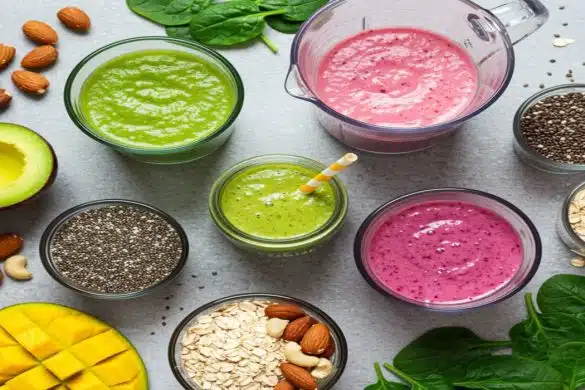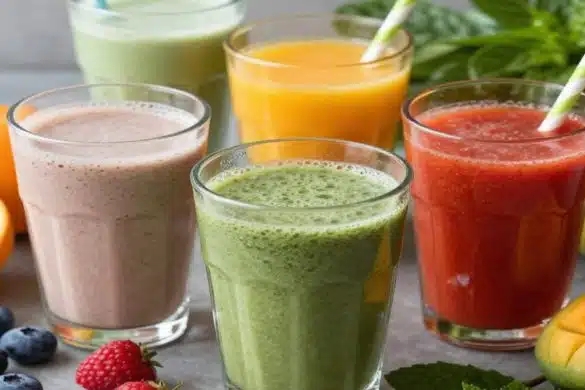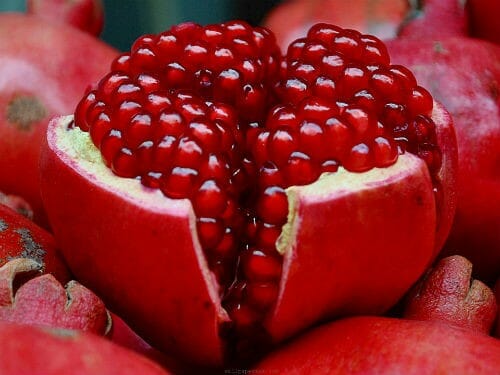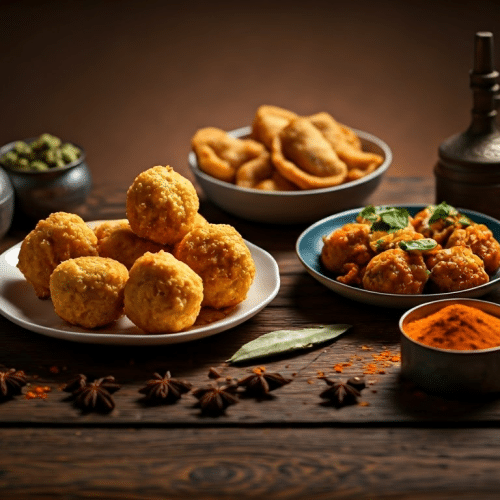Spice has long been celebrated not only for its ability to enhance the flavour of dishes but also for its remarkable health benefits. However, many of us often underestimate their role in our daily lives. Forgotten amid our contemporary lifestyle, their significance extends beyond their culinary uses.
Originating from plants (roots, barks, seeds, etc.), the use of spices has been cherished for centuries for their healing properties. Their use in traditional medicine has roots in ancient times when they were harnessed not only for their delicious flavours but also for their remarkable health-boosting potential.
In this blog, we will explore the enticing world of Indian spices, venturing into their rich profiles, numerous health benefits, and intriguing ways to incorporate them into our everyday diet.

An assortment of colourful Indian spices arranged in small bowls
What are the nutritional properties of spices?
Spices are treasure troves of essential nutrients. Low in calories, they are imbued with protein and contain substantial minerals like iron, calcium, and magnesium.
Some spices, like cinnamon, are esteemed for their abundant antioxidants, while others, like turmeric, boast potent anti-inflammatory properties. Many spices contain phenolic compounds, which aid nutrient absorption.
Despite being used in small quantities, these aromatic seasonings pack an impressive nutritional punch. Let’s quickly learn more about their nutritional properties!
Vitamins and Minerals
Despite their modest use in cooking, spices offer a surprising wealth of vitamins and minerals. They are rich in vitamins A, C, and K, as well as several B vitamins. Notably, most spices contain significant amounts of minerals.
Let’s explore the vitamin and mineral content of some popular spices:
| Spice | Noteworthy Vitamins | Noteworthy Minerals |
| Turmeric | Vitamin C & K | Iron & Magnesium |
| Ginger | Vitamin B3 & B6 | Potassium & Manganese |
| Cinnamon | Vitamin K | Calcium & Iron |
| Cumin | Vitamin E & K | Iron & Calcium |
As this table illustrates, including diverse spices in your diet can help you meet your daily vitamin and mineral needs, contributing to overall health.
Antioxidants and Phytochemicals
A significant aspect of spices’ health benefits is their wealth of antioxidants and phytochemicals. These compounds fight free radicals in the body, reducing oxidative stress and lowering the risk of diseases like heart disease and cancer.
For instance, turmeric curcumin has antioxidant properties that help fight oxidative damage, boosting the body’s own antioxidant enzymes. Likewise, cinnamon’s cinnamaldehyde exhibits potent antioxidant activity. These antioxidants also hold anti-inflammatory properties, battling chronic inflammation and potentially helping prevent Alzheimer’s disease.
Furthermore, spices like cardamom produce compounds that may help fight cancer cells. Thus, the antioxidants and phytochemicals in spices offer powerful protective benefits to our health.
What are some of the health benefits of spices?
Spices have been revered for their broad-ranging health benefits for ages. Their rich micro-nutrient profile endows them with antioxidative, anti-inflammatory, and antiviral properties. Let’s explore their various health benefits.
1. Boosting Immune System
Spices play an integral role in bolstering the immune system. This is majorly due to their high concentration of antioxidants, which combat harmful free radicals in the body. The antimicrobial properties of many spices also help prevent various infections.
Some notable spices for boosting immunity include:
- Turmeric: The antioxidant-rich curcumin in turmeric enhances the body’s antibody responses, strengthening immunity.
- Ginger: Its active compounds, such as gingerol and zingerone, exhibit potent anti-inflammatory and immune-boosting characteristics.
- Garlic: It is loaded with essential nutrients like vitamins C and B6, manganese, and selenium, effectively bolstering the immune system.
- Cayenne Pepper: Containing capsaicin, it can stimulate the body’s defence mechanisms, further enhancing immunity.
All in all, all these spices are an excellent way to boost immunity.
2. Anti-inflammatory Properties
Many spices possess anti-inflammatory properties that help the body fight inflammation, decreasing the risk of diseases associated with chronic inflammation, such as heart disease and cancer.
Some prominent spices with anti-inflammatory benefits include:
- Turmeric: Its active ingredient, curcumin, exhibits strong anti-inflammatory effects, which can match the effectiveness of some anti-inflammatory drugs.
- Ginger: Its compounds, gingerol and zingerone, have demonstrated anti-inflammatory properties, helping with pain management.
- Cinnamon: The spice hosts cinnamaldehyde, which fights inflammation and lowers blood cholesterol levels and triglyceride levels.
- Cayenne Pepper: Known for its active ingredient, capsaicin, it can effectively reduce appetite and boost fat burning while exhibiting strong anti-inflammatory properties.
These spices can be a natural way to curb inflammation, promoting overall health.
3. Improving Digestion
Digestive health can significantly impact overall wellness, and spices can play a helpful role here. Many spices contain properties that aid digestion and promote gut health.
Some notable spices in improving digestion include:
- Ginger: Ginger has been used for centuries as a digestive aid, helping to alleviate conditions like nausea, vomiting, and upset stomachs due to its natural anti-inflammatory properties.
- Cumin: It is known for its carminative properties. Cumin can relieve gas from the body, reduce bloating and aid digestion.
- Turmeric: Turmeric, flaunting its antioxidant and anti-inflammatory properties, can also soothe digestive discomfort, improving digestion while promoting liver health.
Adding these flavourful spices to your diet can contribute positively to your digestive health.
4. Enhancing Brain Function and Memory
Spices are beneficial not only to your body but also to your brain. Certain spices have shown promise in enhancing brain function and memory:
- Sage: Recent research shows that Sage improves brain function and memory, which is particularly useful in Alzheimer’s patients.
- Turmeric: Curcumin stimulates BDNF, a hormone that promotes brain health and prevents brain diseases.
- Cinnamon: Its anti-inflammatory and antioxidant properties may protect the brain against neurological disorders.
- Ginger: Its bioactive compound, 6-gingerol, exhibits neuroprotective effects, potentially improving brain function.
Including these spices in your diet may help boost your brainpower, keeping your mind sharp and focused.
5. Supporting Heart Health
Cardiovascular health positively impacts overall longevity, and consuming certain spices is a delectable way to support heart health.
- Garlic: Garlic is beneficial in significantly reducing blood pressure in people with high blood pressure. It’s been shown to lower cholesterol and reduce the risk of heart disease.
- Turmeric: Turmeric and its powerful compound curcumin, with its anti-inflammatory and antioxidant properties, may significantly lower the risk of developing heart disease by improving the function of blood vessels.
- Chilli powder: Chilli powder, on the other hand, contains capsaicin and could promote cardiovascular health by improving blood circulation and reducing blood clotting.
You may enhance your heart’s health by incorporating these heart-friendly spices into your meals!
6. Blood Sugar Regulation
Several spices have been used traditionally to help manage blood sugar levels. It is proven to be particularly useful for people with or at risk for type 2 diabetes:
- Cinnamon: It has been shown to reduce fasting blood sugar levels and improve insulin sensitivity, making it beneficial for managing diabetes.
- Fenugreek: Its amino acid 4-hydroxyisoleucine can improve the function of insulin, leading to significant reductions in blood sugar levels.
- Turmeric: Curcumin in turmeric can decrease blood sugar and inflammation, with marked benefits in diabetes.
- Ginger: It is believed to help reduce fasting blood sugar levels and improve long-term blood sugar control.
Including these spices in your diet could help maintain healthy blood sugar levels, providing an easy, flavourful way to manage them.
Incorporating Spices into Your Diet
Enriching your diet with spices not only escalates the flavour profile of your meals but infuses them with an array of health benefits. Spices can be incorporated readily into meals.
Here’s how you can do it:
- Adding a cinnamon stick to your morning tea or coffee can regulate your blood sugar levels.
- Sprinkling turmeric in your soups or on your vegetables can increase its antioxidant properties.
- Supplement your morning eggs or pan-fried vegetables with a dash of cumin for a flavour boost and digestive aid.
- Fresh ginger and cardamom can be added to herbal teas for a soothing, immunity-boosting drink.
- Redefine salad dressings with a hint of crushed coriander seeds, or infuse them with your choice of protein to enhance digestion.
Note: Adding these spices doesn’t require grandeur culinary skills; just a pinch can simply do the trick. As integrating these healing spices into our diet is genuinely straightforward, it invites an effortless step to support a healthy life.
Conclusion
In conclusion, we would like to remind you once again that spices are not just a delectable addition to your indian dishes; they also carry a plethora of health benefits. From boosting your immune system to protecting your heart, managing blood sugar levels, and aiding digestion, the advantages of incorporating spices into your diet seem almost endless.
Moreover, modern research has cemented their place as potent natural healers, proving what ancient medicine had preached for centuries. So, next time you’re cooking, remember that each pinch, dash, or spice sprinkle enhances your meal’s taste and health quotient.
So, go ahead and infuse your foods with turmeric, ginger, cumin, and a myriad of other spices while embarking on a delectable culinary journey and a healthy lifestyle.
Frequently Asked Questions
What are the benefits of Indian spices?
Indian spices like turmeric, ginger, cinnamon, cumin, cardamom, and coriander offer numerous health benefits. These include promoting heart health, boosting the immune system, aiding digestion, supporting bone health, and regulating blood sugar levels, all while infusing exquisite flavours into the dishes.
Which spice has the most health benefits?
All spices offer unique health benefits. However, turmeric is often singled out for its powerful active compound, curcumin, which exhibits strong anti-inflammatory and antioxidant effects. These characteristics of turmeric benefit numerous health conditions, from heart disease to cognitive health issues.
Are there any side effects or allergies associated with spice consumption?
While they are generally safe, some people may experience allergies or adverse reactions to certain spices. Symptoms can range from mild irritations to severe allergic reactions. Always introduce new spices gradually into your diet and monitor your body’s response.
How can I store spices to ensure their freshness and potency?
Store spices in a cool, dry place away from direct sunlight or heat sources to retain their freshness and potency. Please keep them in airtight containers to prevent moisture absorption. While ground spices are usually good for six months to a year, whole spices can stay fresh for up to two years.
How can I use spices to enhance the flavour of my meals?
Spices can be used in sauces, marinades, dressings, soups, and beverages. They can also be sprinkled over salads or roasted vegetables, used in rubs for meats and fish, or infused in teas and smoothies. Your culinary creativity is the only limit to your spice use.














1 comment
I am very happy to read your articles it’s very useful for me,and I am completely satisfied with your website.All comments and articles are very useful and very good.
Your blog is very attention-grabbing.